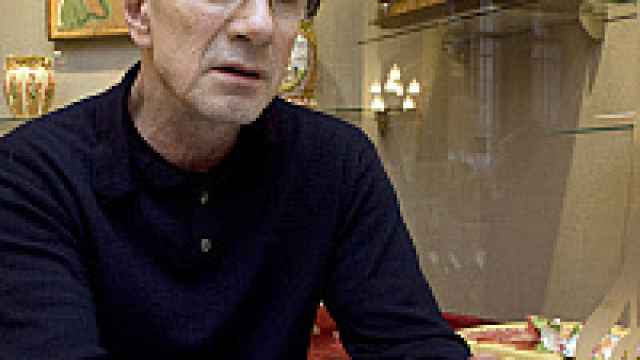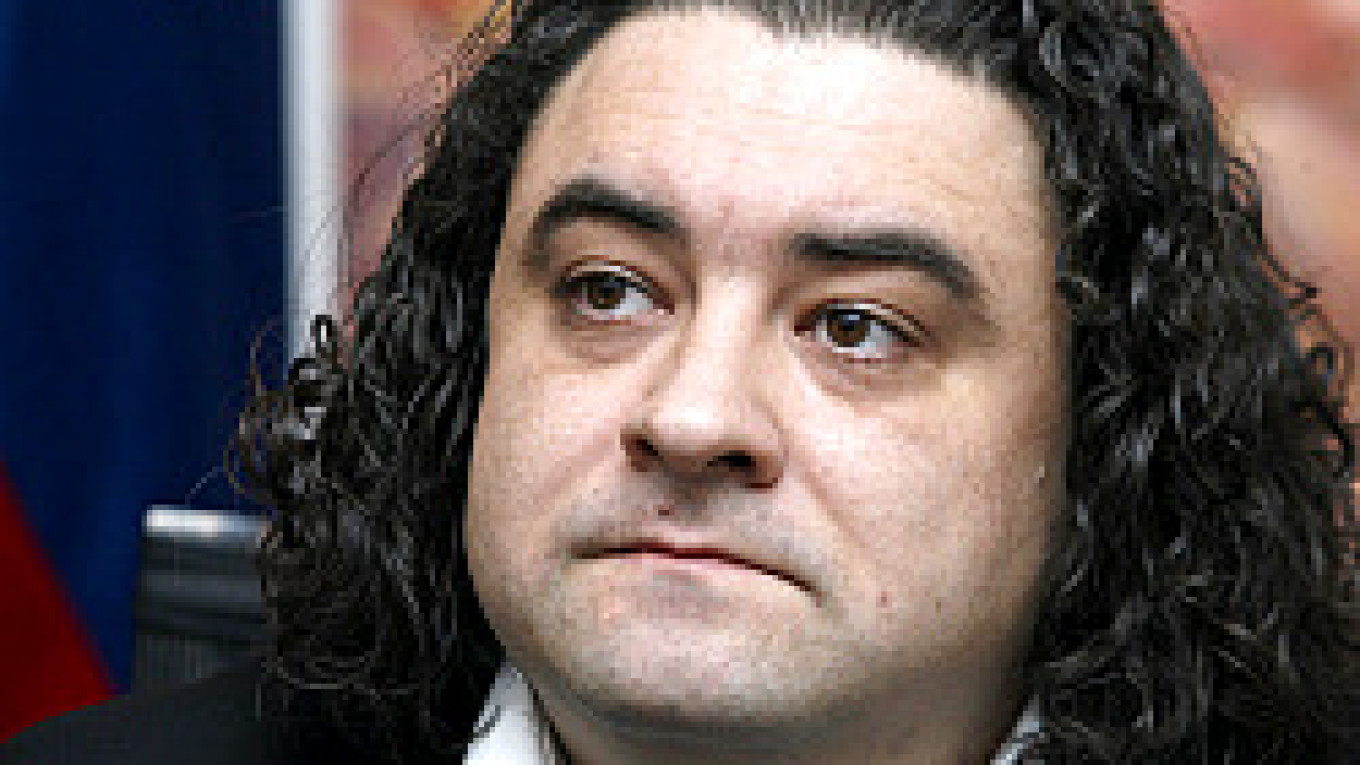"Many walk away disappointed when they don't find buttons to operate the world behind my armchair," Russia's top Freemason, former presidential candidate Andrei Bogdanov, said jokingly in his office in central Moscow.
Freemasonry -- whose obscure origins have been traced to sometime between the building of King Solomon's temple in the 10th century B.C. and the 16th century A.D. -- once boasted an elite following in Russia, including 18th- and 19th-century nobility, poet Alexander Pushkin, architect Vasily Bazhenov and war heroes Alexander Suvorov and Mikhail Kutuzov.
These days, however, it is a more modest order. Indeed, the secret fraternity does not count any billionaires or senior politicians as members, said three Freemasons and two historians.
"There are people close to the ruling circle among us, but they are in the second tier, and you will rarely see them on TV," Bogdanov said, declining to provide any names.
Most members are middle-class intellectuals, retired military officers and small-time businessmen, said Sergei Karpachyov, a historian who has authored several books about Russian Freemasonry.
Bogdanov, the grand master of the Grand Lodge of Russia, as the order calls its governing body, is perhaps Russia's best-known Freemason, after he ran for president on March 2, placing last with 1.3 percent of the vote. He first took the spotlight in late 2007 when his Democratic Party ran in State Duma elections, winning a miniscule 0.13 percent.
Bogdanov made no secret of his association with Freemasonry during both campaigns, although he said in the interview that his decision to participate was his own and not backed by his Grand Lodge.
"We don't talk politics or religion," he said of Grand Lodge meetings. "These are the two issues that may strain relations between brothers."
Freemasonry has been viewed with suspicion for centuries, largely because of its reputation as a clandestine, male-only society that uses secret handshakes and passwords to recognize members. To be in good standing, Russian Freemasons, like their counterparts elsewhere, must belong to a "regular" lodge -- one where members are all male, believe in a "supreme being" and do not engage in politics, said Georgy Dergachyov, grand master of the first lodge, Northern Star, to open in post-Soviet Russia.
Members who do not comply attend "irregular" lodges, which are not considered part of the main group.
Bogdanov's decision to dabble in politics, however, has not affected his status. Bogdanov explained that Freemasons did not impose their views on one another and that he had run on his own, not as a Freemason.
There are an estimated 5 million Freemasons worldwide, including 2 million in the United States, but just over 500 people have joined in Russia since the first regular lodge opened in 1992, said Vladimir Nikitin, the grand secretary of the Grand Lodge of Russia.
Half of all new Freemasons stop being active members within two years, Nikitin said.
 Vladimir Filonov / MT Dergachyov said he first became interested in Freemasonry in the 1980s. | |
To set up a national lodge in any country, seven Freemasons holding the rank of master are needed, said Karpachyov, the historian.
After Dergachyov, six more Russians were initiated in France, and the seventh set up the Northern Star lodge in Moscow. A year later, it became regular. "Then as I learned more about Freemasonry, I decided that it would be better if Russian Freemasonry became regular," Dergachyov said.
The first Freemasons on Russian soil were British. The earliest documents about Russian Freemasonry date back to 1731, when Captain John Phillips was appointed by the Grand Lodge of England as the provincial grand master of Russia and Germany, said Andrei Serkov, a historian studying Freemasonry at the Russian State Library.
Freemasonry was popular among Europe-oriented Russian nobility until 1822, when Alexander I banned it by an edict that also ordered state bureaucrats to give an oath not to get involved with Freemasons. Freemasonry continued in a semilegal manner, Serkov said.
Unlike the Roman Catholic Church and many other faiths, the Russian Orthodox Church has never openly criticized Freemasons, although it has viewed them with suspicion, Karpachyov said.
Many Freemasons fled after the Revolution and kept lodges abroad. In 1922, Leon Trotsky made a call at the Fourth Congress of Comintern for Communists around the world to abandon Freemason lodges. After that, remaining lodges in Russia were targeted by the Soviet authorities together with all other secret organizations.
Freemasons remain quite secretive today, with Dergachyov, Nikitin and Bogdanov refusing to name fellow members. The Grand Lodge of Russia has had four grandmasters, but Derchachyov and Bogdanov are the only two who have revealed themselves to the world of profanes, as Freemasons call nonmembers.
Lodges convene once a month and have a joint assembly every year. Bogdanov was elected grand master at such an assembly in June 2007, attended by some 100 delegates. Lodge meetings usually begin with presentations dedicated to the arts or science, followed by a discussion and a social talk, which continues during the agape, an informal dinner, Freemasons said.
Nikitin said an informal rule required Freemasons to socialize with other Freemasons and that this was the only way to be promoted in rank, by demonstrating knowledge and communication skills. The Grand Lodge follows 33 graduses, or steps, from the Scottish Masonic charter.
To become the legitimate Grand Lodge of Russia, it needed to be established by a foreign grand lodge, and this happened in 1995, when the Grand National Lodge of France established the Grand Lodge of Russia. Since then, Bogdanov said, more than 90 foreign grand lodges have recognized the Russian lodge.
Bogdanov's presidential bid stirred public interest in Freemasonry, said Nikitin, with the number of visitors to the lodge's web site soaring and the number of e-mails -- some with requests to join -- increasing to several dozen per day.
"Still, we initiate no more than 10 new members per month," he said. Initiation is preceded by numerous interviews by Freemasons.
The lodges were officially registered with the authorities as public organizations in 1993, and after a new law on nongovernmental organizations went in effect in 2006, they were re-registered as noncommercial partnerships. Bogdanov said the re-registration went without a hitch. Many NGOs have complained of cumbersome paperwork required for re-registration, and some have had to close.
The lodges are funded by annual fees of around 2,500 rubles, paid by members, Bogdanov said.
"We have also a lodge in Moscow where all communication is in English for the convenience of visiting brothers from abroad," he said.
In the years since its rebirth in the 1990s, Russian Freemasonry has not managed to grow into a phenomenon and probably never will, historians said. "Freemasonry has no big future in Russia. It belongs to a European culture that is still alien for most Russian," Karpachyov said.
A Message from The Moscow Times:
Dear readers,
We are facing unprecedented challenges. Russia's Prosecutor General's Office has designated The Moscow Times as an "undesirable" organization, criminalizing our work and putting our staff at risk of prosecution. This follows our earlier unjust labeling as a "foreign agent."
These actions are direct attempts to silence independent journalism in Russia. The authorities claim our work "discredits the decisions of the Russian leadership." We see things differently: we strive to provide accurate, unbiased reporting on Russia.
We, the journalists of The Moscow Times, refuse to be silenced. But to continue our work, we need your help.
Your support, no matter how small, makes a world of difference. If you can, please support us monthly starting from just $2. It's quick to set up, and every contribution makes a significant impact.
By supporting The Moscow Times, you're defending open, independent journalism in the face of repression. Thank you for standing with us.
Remind me later.


